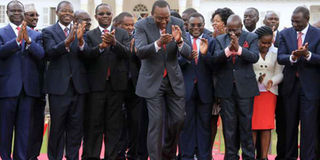Fat chance UhuRuto new party will ever unite Kenyans

President Uhuru Kenyatta, his Deputy William Ruto and officials of parties that will merge and form the Jubilee Party at State House, Nairobi, on August 9, 2016. PHOTO | JEFF ANGOTE | NATION MEDIA GROUP
What you need to know:
- Mzee Jomo Kenyatta, the country’s founding father, shouted himself hoarse at public meetings telling Kenyans to be united for 15 years until his death in 1978.
- Daniel arap Moi, took the national unity rhetoric and party loyalty a notch higher with his Nyayo philosophy at some point requiring schoolchildren to recite a verse pledging loyalty to ‘the President and nation of Kenya’ and small businesses to pay levies to the red-shirt Kanu youth wingers.
- The divisions in the Kenyan society along ethnic lines persisted, suggesting the people simply didn’t believe Mzee Kenyatta’s and Mr Moi’s national unity rhetoric.
President Uhuru Kenyatta has taken to preaching unity a lot lately. Jubilee Party, the new vehicle — assembled from TNA, URP, New Ford Kenya and some other parties with funny names — for the President’s re-election bid in 2017 is being sold as the party of national unity.
It is not clear if Mr Kenyatta will go ahead and base his campaign on a national unity platform as well. But if he does, he will have chosen a very problematic platform for himself.
It is one thing to preach unity on the podium and another to make Kenyans believe you. Much of the cynicism has to do with history.
After the dissolution of the federalist party Kadu a year after independence in 1963 and the outlawing of Jaramogi Oginga Odinga’s KPU in 1969 Kenya was virtually a single party state under Kanu until 1992 when a proper multiparty election was held.
Mzee Jomo Kenyatta, the country’s founding father, shouted himself hoarse at public meetings telling Kenyans to be united for 15 years until his death in 1978.
His successor, Daniel arap Moi, took the national unity rhetoric and party loyalty a notch higher with his Nyayo philosophy at some point requiring schoolchildren to recite a verse pledging loyalty to ‘the President and nation of Kenya’ and small businesses to pay levies to the red-shirt Kanu youth wingers.
But the divisions in the Kenyan society along ethnic lines persisted, if not widened, suggesting the people simply didn’t believe Mzee Kenyatta’s and Mr Moi’s national unity rhetoric.
NATION AL UNITY PROJECT
The failure of the national unity project under the country’s first two presidents has been widely blamed on an exclusionist state agenda, which saw their respective ethnic elites hog power and their regions favoured in the distribution of national resources.
The bungling of the most recent attempt at nation building with the election of the Narc government under Mwai Kibaki in 2002 and the end of Kanu’s rule — easily the most promising one since independence — left Kenya on the brink of a civil war in 2007 and 2008.
So can President Kenyatta succeed where his father (Mzee Kenya), his political mentor (Mr Moi) and his godfather (Mr Kibaki) failed?
Fat chance! Of the four presidents, the younger Kenyatta has been the most divisive having been elected on the back of the ethnic bloodletting of 2007 and 2008, helped by his ability to mobilise a strong voting bloc around grievances related to the turmoil.
His Jubilee administration has done little to avoid the same accusations of exclusionism in State appointments and distribution of national resources that have been made against his predecessors and tested national cohesion in the past.
Then there is the brazen declaration of ethnic duopoly in the latest Jubilee game plan under which Mr Kenyatta is to rule for another five years and pass the baton in 2022 to Deputy President William Ruto, who is to rule until 2032. So much for national unity.
[email protected]; @otienootieno





